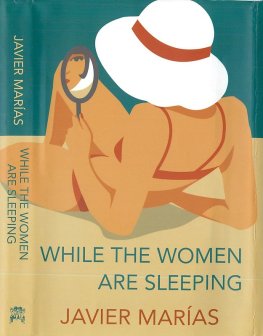
BY JAVIER MARAS
AVAILABLE FROM NEW DIRECTIONS
A Heart So White
All Souls
Bad Nature, or With Elvis in Mexico
Dark Back of Time
The Man of Feeling
Tomorrow in the Battle Think on Me
When I Was Mortal
Written Lives
Your Face Tomorrow
Volume One: Fever and Spear
Volume Two: Dance and Dream
Volume Three: Poison, Shadow and Farewell
Javier Maras
WHILE THE WOMEN ARE SLEEPING
Translated by Margaret Jull Costa

A NEW DIRECTIONS BOOK
Copyright 1990 by Javier Maras
English translation copyright 2010 by Margaret Jull Costa
First published in Spain in 1990 as Mientras ellas duermen by Alfaguara, Grupo Santillana de Ediciones, S.A.: While the Women Are Sleeping contains ten of the original Spanish editions stories.
Published by arrangement with Mercedes Casanovas Agencia Literaria, Barcelona.
Grateful acknowledgment is made to the magazines and anthologies where some of these stories originally appeared: The Dedalus Book of Spanish Fantasy, Leopard II: Turning the Page, Leopard IV: Bearing Witness, The New Yorker, The Reading Room, The Threepenny Review, and Zoetrope . In addition, While the Women Are Sleeping was published as a limited edition from The Thornwillow Press with monotypes by Wendy Mark.
The translator would like to thank Javier Maras, Annella McDermott, Palmira Sullivan, and Ben Sherriff for all their help and advice.
All rights reserved. Except for brief passages quoted in a newspaper, magazine, radio, or television review, no part of this book may be reproduced in any form or by any means, electronic or mechanical, including photocopying and recording, or by any information storage and retrieval system, without permission in writing from the Publisher.
Manufactured in the United States of America
New Directions Books are printed on acid-free paper.
First published clothbound in 2010
Design by Semadar Megged
Ebook conversion by Erin Schultz, TIPS Technical Publishing, Inc.
Library of Congress Cataloging-in-Publication Data
Marias, Javier.
[Mientras ellas duermen. English]
While the women are sleeping / by Javier Marias ; translated by
Margaret Jull Costa.
p. cm.
First published in Spain in 1990 as Mientras ellas duermen.
ISBN 978-0-8112-1663-0 (hardcover : alk. paper)
ISBN 978-0-8112-1914-3 (pbk. : alk. paper)
1. Marias, JavierTranslations into English. 2. Short stories,
SpanishTranslations into English. I. Costa, Margaret Jull. II. Title.
PQ6663.A7218M5413 2010
863.64dc22 2010021110
10 9 8 7 6 5 4 3 2 1
New Directions Books are published for James Laughlin
by New Directions Publishing Corporation
80 Eighth Avenue, New York 10011
CONTENTS
AUTHORS NOTE
O f the ten stories that make up this collection, a few perhaps require some explanation.
Lord Rendalls Song was first published in my anthology Cuentos nicos (Ediciones Siruela, Madrid, 1989) in apocryphal form, that is, attributed to the English writer James Denham and purportedly translated by me. For that reason, I also include at the beginning of the story the biographical note that appeared there, since some of the facts in it contribute, tacitly, to the story itself, which would, otherwise, remain incomplete.
The Life and Death of Marcelino Iturriaga was published in El Noticiero Universa l (Barcelona, April 19, 1968). It was, I believe, my first published piece. I was sixteen when it appeared, although I see from my typewritten original that it was written on December 21, 1965, that is, when I was just fourteen (be kind, please). Perhaps the most interesting thing about it, however, is that it bears some similarity to another story of mine, When I Was Mortal, written in 1993 and included in the story collection of the same name.
As regards A Kind of Nostalgia Perhaps, I was asked to contribute a story to a Mexican anthology, the royalties for which would go towards helping children in the state of Chiapas, who would provide the illustrations for the book. The deadline was so short that I decided to adapt an earlier story No More Love, which appeared in the collection When I Was Morta l. The English characters have been replaced by Mexicans, and the ghost is no longer a nameless rustic youth.
Javier Maras, 2010
WHILE THE WOMEN ARE SLEEPING
For Daniella Pittarello, in gratitude
for all her useful knowledge
F or three weeks, I used to see them every day and now I dont know what will have become of them. I probably wont ever see them again, at least not herone tends to assume that summer conversations and even confidences will lead nowhere. Not that anyone has anything against that, not even me, even though I do wonder about them or perhaps miss them slightly. Only very slightly, as one misses everything that disappears.
I nearly always saw them at the beach, where its difficult to get a good look at anyone. Particularly so in my case, because Im nearsighted and would rather see everything through a haze than return to Madrid with a kind of white mask on my otherwise tan face, and I never wear my contact lenses when I go to the beach or the sea, where they might be lost forever. Nevertheless, from the very first moment, I was tempted to rummage around in the bag in which my wife, Luisa, keeps my glasses casewell, the temptation came from her really, because she, if I may put it like this, was constantly transmitting to me the more peculiar activities of the more peculiar bathers around us.
Yes, I can see him, but only vaguely, I cant make out his actual features, I would say when she, in an unnecessarily low voice, given the noise level on the beach, would point out some character she found particularly amusing. I would keep screwing up my eyes, reluctant to get my glasses out only to have to return them once more to their hiding place once my curiosity was satisfied. Then one day, Luisa, who knows the strangest and most insignificant things and is always surprising me with scraps of useful knowledge, passed me her straw hatcloser to hand than my hidden glasses since it was on her headand advised me to look through its mesh. And I discovered that by peering through this screen I could see almost as well as with my contact lenses, more clearly in fact, although my field of vision was greatly reduced. From that point on, I myself must have become one of the more peculiar or eccentric beachgoers, bearing in mind that I often had a womans straw hat, complete with ribbons, clamped to my face with my right hand while I scanned the length and breadth of the beach near Fornells, where we were staying. Luisa, without a word of complaint or a flicker of annoyance, bought another hat that she didnt like as much, because hers, with which she had intended to shade her faceher fine-featured, open, and as yet unlined facebecame mine, not for my head, but for my eyes, the hat through which I saw.
One day, we were enjoying ourselves following the exploits of a small Italian sailor, that is, an insubordinate one-year-old wearing nothing but a sailors hat, who, as we kept reporting to each other, was going around destroying not only the fortifications built in the sand by his siblings and older cousins but doubtless some of his progenitors long-term friendships, and doing so with the same aplomb with which he drank the salt water (he seemed to swallow gallons) to the complete unconcern of the families accompanying him. He frequently lost his sailors hat and then was left completely naked, lying on the shore like a spurned cupid. On another day, we followed the despotic comments and idle comings and goings of a middle-aged Englishmanthe island was heaving with Britswho kept up a kind of running commentary on the temperature, the sand, the wind and the waves, speaking as emphatically and grandiloquently as if he were uttering deep, long-pondered maxims or aphorisms. He had the virtue, one that is becoming increasingly rare, of believing that everything is important, or, rather, that everything that comes from oneself has the virtue of knowing itself to be unique. His slothful nature was evident in how he sathis legs always inelegantly splayedand in the fact that he never took off the green T-shirt with which he protected his barrel chest from the sun, not even to go into the water. Needless to say, he never swam and when he did wade into the sea, never very far, he only did so in pursuit of one of his offspring so as to photograph him or her in action from a better angle or closer up. With his green stomachbut not, for example, his chestwet from the waves, he would return to the shore muttering further unforgettable pronouncements, which the wind promptly scattered, and pressing his camera to his ear, as if it were a radio, concerned, apparently, that it might have got splashed, a primitive way, I suppose, of checking that it had come to no harm. Or perhaps, we thought, it was some kind of camera-radio.
Next page













